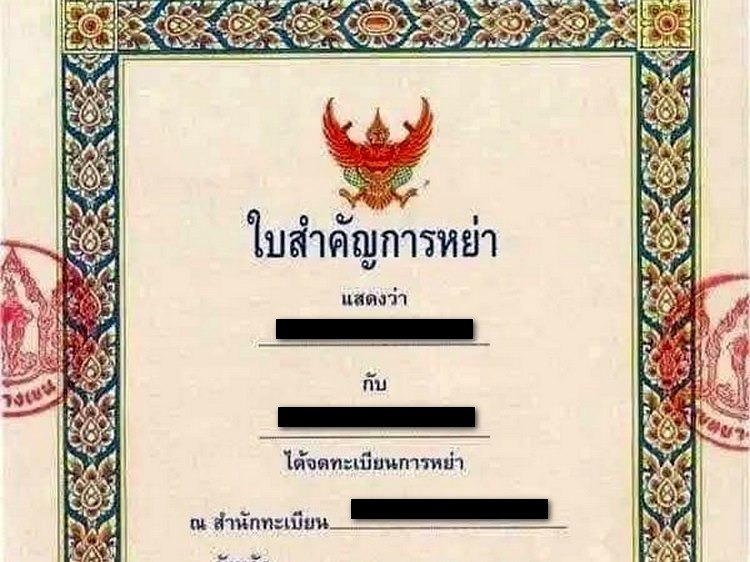
I’m sharing this story because I’ve often seen foreign men misunderstand how the Thai legal system works in divorce cases, especially when they’re married to Thai women. The belief that marrying a Thai woman automatically places them at a disadvantage is still widespread. The typical assumption is that the wife’s name must be used to buy houses or land, and when the relationship ends in divorce, the man loses everything.
This belief stems from fear and, unfortunately, stories of worst-case scenarios. However, as someone who has spent years as a legal advocate representing foreign clients in such disputes, I’ve seen firsthand that the law isn’t inherently biased – it’s the interpretation and strategy used in legal arguments that matter most.
In Thailand, the law provides specific grounds for divorce, and these grounds often form the basis of claims made in court. What’s important to understand is that Thai divorce law tends to rely on “blame-based” claims. In many cases, one party will argue that the other’s actions are the reason for the breakdown of the marriage. Common accusations include:
1. Adultery – Claiming that one spouse was unfaithful and violated the marital bond.
2. Abandonment of Responsibility – Alleging that one spouse failed to fulfill the obligations of support, care, and companionship.
3. Domestic Violence or Abuse – Citing physical or emotional abuse, which led to an unsafe or intolerable living situation.
4. Incompatibility and Irreconcilable Differences – Although less blame-focused, this often ties back to claims of frequent disputes or constant arguments.
5. Financial Neglect or Control – Alleging that one spouse irresponsibly withheld financial support or mismanaged family assets.
In many of the cases I’ve handled, the arguments presented in court often come down to emotional and financial grievances. For example, the Thai spouse may file a case based on claims of being mistreated or unsupported, while the foreign spouse may struggle with the perception that they must “prove their innocence.” This can make the legal process seem intimidating, especially if the foreign party is unfamiliar with how the Thai legal system works.
Navigating a “Fault-Based” System
In a fault-based system, the party making accusations must present evidence to support their claims. However, the defending party also has the right to refute these claims with counter-evidence. This is where having a clear legal strategy and thorough understanding of the facts becomes crucial. If the defense can demonstrate that the accusations are false or exaggerated or show evidence of mutual fault—it can shift the outcome of the case significantly.
For example, in some of my cases, the Thai spouse alleged abandonment or emotional neglect, but we were able to provide clear evidence that the foreign client had, in fact, provided financial support and made efforts to maintain the relationship. In another case, accusations of adultery were dismissed because there was no credible evidence to back the claim.
Seeking Justice, Not Revenge
What I’ve learned over the years is that the law isn’t about choosing sides based on nationality—it’s about finding justice based on the facts. When emotions run high, it’s easy for either party to turn the legal process into a means of retaliation rather than resolution. But in every case, the ultimate goal should be fairness and respect for the truth.
Many of my foreign clients come to me feeling disillusioned, assuming that the legal system is stacked against them. However, after going through the process with proper representation, they often leave with a newfound respect for Thai law and its principles of justice.
We’ve secured victories not only in the lower courts but also in the appellate and supreme courts. These outcomes demonstrate that, contrary to popular belief, the Thai legal system can be just as fair and balanced as any respected international legal system.
Final Thoughts
Divorce cases can be messy, emotional, and stressful especially when cultural misunderstandings and legal complexities intersect. But fairness in the legal system isn’t determined by where you’re from it’s determined by the strength of your case and the integrity of your legal representation. The law is not your enemy. It’s a framework designed to deliver justice when approached with respect, preparation, and a commitment to the truth.
For anyone facing such a situation, my advice is to stay calm, gather the facts, and work with someone who knows how to navigate the intricacies of the law. Justice may take time, but with the right approach, it can and often will prevail.
 Victor Wong (Peerasan Wongsri)
Victor Wong (Peerasan Wongsri)
Victor Law Pattaya/Tax expert
Email: <[email protected]> Tel. 062-8795414










